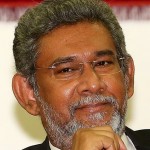The Post-Election Scenario: Lessons & Options For Govt & Opposition
By Dayan Jayatilleka - March 31, 2014
 A famous soliloquy in the history of Hollywood movies in Don Siegel’s iconic film Dirty Harry begins with Clint Eastwood, playing Inspector Harry Callahan says “I know what you’re thinking— did he fire six shots or only five…” In similar vein I can tell what the strategists of the Opposition are thinking after the Provincial Council election: “when we add the total vote of the ethnic and religious minorities to the 25% plus that the UNP has got, we can get the 50.1% we need to beat Mahinda Rajapaksa”.
A famous soliloquy in the history of Hollywood movies in Don Siegel’s iconic film Dirty Harry begins with Clint Eastwood, playing Inspector Harry Callahan says “I know what you’re thinking— did he fire six shots or only five…” In similar vein I can tell what the strategists of the Opposition are thinking after the Provincial Council election: “when we add the total vote of the ethnic and religious minorities to the 25% plus that the UNP has got, we can get the 50.1% we need to beat Mahinda Rajapaksa”.
In that movie scene, Dirty Harry went on to add a qualifier: “but seein’ as this is a .44 Magnum, the most powerful handgun in the world and could blow your head clean off, there’s one question you’ve gotta ask yourself— do you feel lucky?” My response to the Opposition’s calculation is a similar one: “but seein’ as this will be a Presidential election, which is a popularity duel for leadership of the country, and you’re fielding Ranil Wickremesinghe against Mahinda Rajapaksa, there’s just one question you’ve gotta ask yourself— do you feel lucky?”
All the post-election analyses I read from the critics, tell me that they either do not know or have forgotten what Trotsky said about politics, namely that arithmetic is trumped by higher algebra. The higher algebra is that the Sri Lankan system is presidential, not parliamentary, and while the result of the PC election may be a pointer to future trends, it is far likelier to be indicative of parliamentary trends than the prospects at a Presidential election. The socio-psychological dynamics are quite different in a contest between two candidates for the top spot; for the leadership of the country. This does not mean that Mahinda Rajapaksa is unbeatable. He can certainly be given a run for his money and may even be beatable, but certainly not by Ranil Wickremesinghe who has seen a slight drop in the performance of his party and caused a significant drop of 5,000 votes in his party’s performance in his own Colombo Central, while the most significant improvement in his party’s performance has been spearheaded by his obvious rival for party leadership.
The Government has declined noticeably in its popularity, but the UNP has not only failed to gain, it has a huge gap to bridge between itself and the Government’s percentage of votes. Most dramatic is the fact that the gap between the UNP and the Government, which is 30% plus, is a greater percentage than the votes polled by the UNP. This means that in order to beat the Government the UNP would have to more than double its vote.

